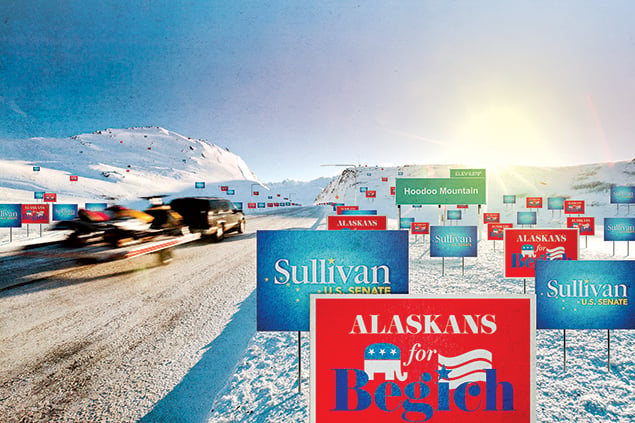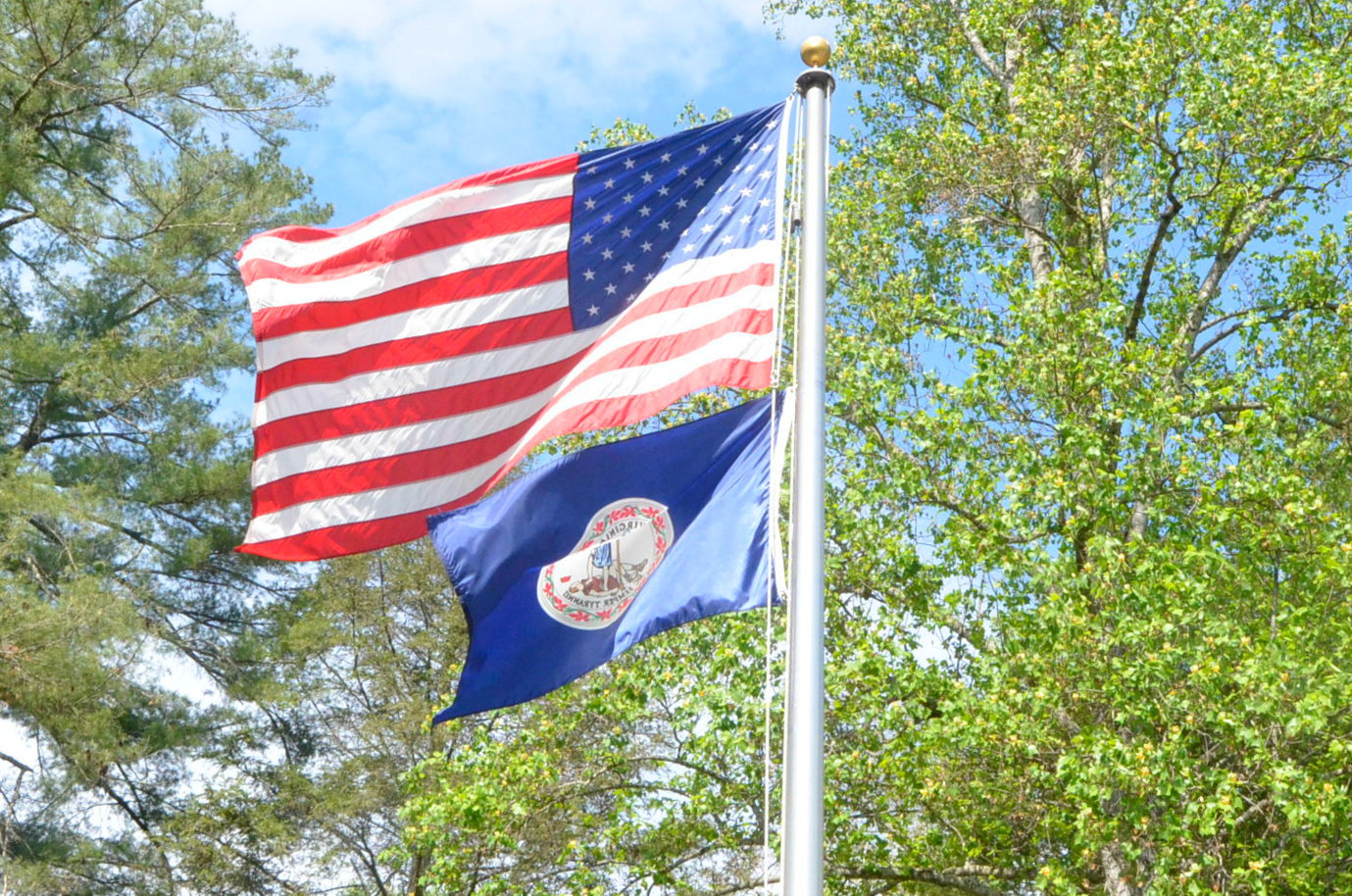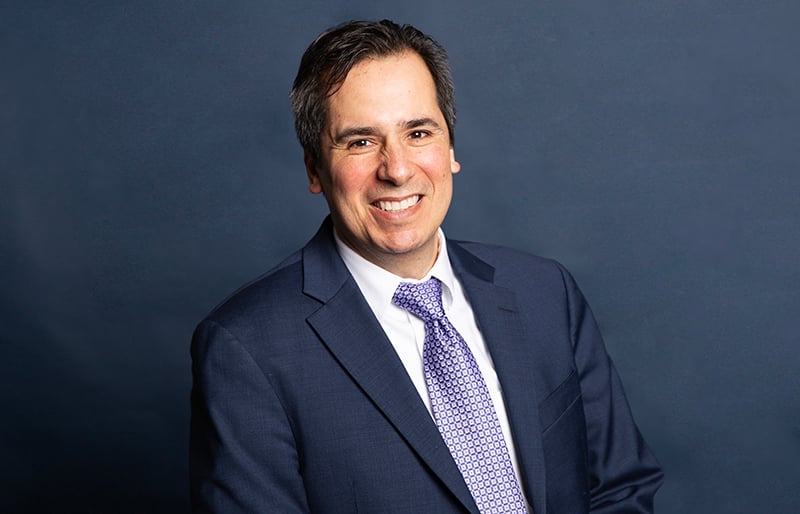It had been an epic day of mid-20s temperatures and blue skies, a perfect start to Arctic Man, the annual ski and snowmobile race held near Alaska’s remote Hoodoo Mountains.
Drawing some 13,000 “slednecks,” Arctic Man’s booze-and-fossil-fueled recreational-vehicle encampment temporarily becomes the state’s fourth-most populous city. At the end of this year’s first practice run in early April, the Arctic Man beer tent was packed with tired, sunburned faces as Dan S. Sullivan climbed to the stage. In a crowd that included a gentleman wearing a snout-to-tail wolf pelt, Sullivan—a bit overdressed in a spotless Carhartt work jacket and crisp jeans—was an odd spectacle.
But as Arctic Man’s founder, Howard Thies, recited his résumé, Sullivan smiled easily, with none of the needy impatience many politicians exhibit in front of unscripted crowds. Compact with a close haircut, Sullivan looks more like the Marine reservist he still is than his more recent incarnations as a George W. Bush-administration functionary (and Bethesda resident), Alaska attorney general, and commissioner of the state’s powerful Department of Natural Resources.
“And he’s running to be our next senator!” boomed Thies, turning over the microphone to Sullivan.
In many rooms back in Anchorage, that announcement would invite an attentive silence, and even here in the wild, the man in the wolf pelt looked up from his beer. The state’s last senatorial election, in 2010, fell into chaos after Joe Miller, a Tea Party insurgent, beat incumbent senator Lisa Murkowski in the Republican primary by promising to make Alaska, a state that relies heavily on federal largesse, more independent from Washington.
Until Republican Eric Cantor fumbled away his Virginia House seat and a leadership position in June, Miller’s victory was considered the Tea Party’s standout achievement. When Alaskans realized that Miller actually meant what he said, however, they made Murkowski the first senator to be elected as a write-in candidate since Strom Thurmond in 1954.
Four years later, the lessons of that fight seem to have penetrated. On August 19, Republican primary voters will pick their challenger to first-term Democratic senator Mark Begich. Sullivan, the establishment Republican candidate, has led in the polls by double digits over Lieutenant Governor Mead Treadwell, who in recent ads has promised to “fight every day to get the federal government off our backs,” and Miller, who, reprising his 2010 campaign, also inveighs against federal meddling.
Sullivan, too, works “federal overreach” into his appearances. On the beer-tent stage at Arctic Man, he produced a thin booklet from his back pocket, saying, “Anyone know what this is?” A symphony of swishing nylon followed as snowsuited riders turned to get a look. “This is a copy of the United States Constitution,” he said to scattered cheers. But in the double-time version of his stump speech that followed, Sullivan mostly tried to tie Begich to standard Republican bogeys like “the Barack Obama agenda” and Democratic Senate majority leader Harry Reid.
“Most Alaskans understand the role of state and federal dollars,” says Lindsey Holmes, a state representative from West Anchorage and a career Democrat who switched parties last year. In Alaska’s mostly roadless, far-flung communities, she points out, “you gotta have a health clinic, you gotta have an airstrip, and these are not things the private sector is going to provide. Because of that, I don’t think [Tea Party politics] resonates the way it does somewhere else.”
Or Alaska may just be an extreme version of what’s going on across the Lower 48. Cantor’s loss aside, midway through its third electoral cycle, the Tea Party has seemed to slip, foundering in primaries from Kentucky to Texas to Idaho—states, like Alaska, that seem to share the movement’s ethic of personal freedom and states’ rights. But increasingly these abstractions are running up against the realities of local politics and voters’ pocketbooks.

• • •
In 2010, the Tea Party seemed to catch its host body, the GOP, off guard. In Missouri, Indiana, Delaware, and Utah, upstarts knocked out mainstream candidates in the primaries, depriving the party of, if not a seat, a dependable member of the Republican caucus.
Mainstream Republicans were better prepared this time. Incumbents shifted rightward, anticipating a rush of “constitutional conservatives” in the primaries, and began spending more time with constituents. Karl Rove’s powerful American Crossroads super-PAC helped fund a new Conservative Victory Project to provide establishment candidates’ campaigns with financial support.
In some places, sitting members of Congress have made a virtue of being in the Capitol Hill game. In Mississippi in June, six-term Republican senator Thad Cochran survived a primary runoff by touring military bases and federally funded construction sites fostered in his state. ABILITY TO DELIVER STILL MATTERS FOR MISSISSIPPI VOTERS, read the Washington Post headline the day after he won.
“That’s the tension here,” says Lisa Demer, who covers politics for the Alaska Dispatch News. “ ‘Get the feds out’ is a mantra of officials. But [former Republican senator] Ted Stevens’s career was bringing the federal money here. This new thing is ‘cut the money.’ ”
The Tea Party has other obstacles in Alaska. Nationally, the billionaire brothers Charles and David Koch are godfathers of the movement. In their first full-time foray into direct political spending, the Kansas oilmen are plowing more than $15 million into Senate races through the group Freedom Partners, which sponsored a barrage of attack ads on Begich this spring.
But in February, Koch Industries announced it would shutter a refinery in the town of North Pole, near Fairbanks, eliminating about 80 jobs and allowing Begich to turn their intervention in Alaska into a liability. Begich recently ran ads saying KOCH BROTHERS GO HOME, while his allies have tagged Sullivan for remaining silent as the refinery closed. So unpopular are the Kochs that Sullivan recently tried to turn the tables, accusing Begich of taking their money. (His PAC received a $5,000 donation in 2010.)
Sullivan’s Koch problem cuts another way, too, on the question of “Alaskan-ness.” Begich is the scion of one of Alaska’s best-known families. In October 1972, when Begich was ten, his father, Nick, the state’s third congressman, climbed into a Cessna with House majority leader Thomas Hale Boggs—father of DC megalobbyist Thomas Hale Boggs Jr.—for a flight from Anchorage to Juneau. Neither the plane nor the four men onboard were seen again.
Alaska history is dotted with small-plane crashes—Stevens perished the same way in 2010—and to disappear without a trace in a bush plane in the state is to join a distinctly Alaskan legacy. But the elder Begich’s demise stands out: Having originally won his seat by beating future Alaska governor and senator Frank Murkowski—the current senator’s father—Nick Begich was reelected at the expense of another Alaska Republican mainstay, Don Young, weeks after Begich’s plane went down.
Begich’s campaign hasn’t been shy about bringing up the 1972 crash, focusing a TV spot, “Alaska’s Son,” earlier this year on the story. Begich himself was once a two-term mayor of Anchorage.
“Alaskan-ness” explains in part Sullivan’s presence at Arctic Man. Begich started the campaign season with a veritable “sled-cred” media offensive, releasing two ads within a month showing the Democrat riding a snowmobile. His voiceover recites a National Mall’s worth of federal agencies Begich claims not to take no for an answer from—the Department of the Interior, the Environmental Protection Agency, the National Oceanic and Atmospheric Administration, the Army Corps of Engineers, “national Democrats,” and the White House. Both ads end with Begich riding into the distance over his campaign’s slogan, “True Alaska.”

• • •
Sullivan was born into a wealthy Ohio family. His grandfather’s chemical business grew into RPM International, which makes Rust-Oleum and had 2013 sales of $4.1 billion. He attended Harvard and Georgetown Law, and while in Washington he met his future wife, Julie Fate, a staffer for Senator Stevens and daughter of a former state representative. Sullivan didn’t move to Alaska till 1997, after his Marine hitch ended. In 2002, after clerking for two prominent judges and a turn at a corporate law firm in Anchorage, he returned with his family to DC, where he took a post in the White House, then was assistant secretary of State for economic, energy and business affairs, negotiating trade pacts under Condoleezza Rice.
In all, Sullivan has lived in Alaska ten years and has held two state cabinet positions under two governors. But his two rivals have tried to paint him as a carpetbagger, with Begich pointing to the whopping $1,192 in property-tax breaks he earned in three years as a Bethesda homeowner for maintaining a primary residence in Montgomery County.
“We know people are far away from family and friends, people are likely to meet newcomers and just invite them over for dinner,” says Alaska state representative Lindsey Holmes. “The flip side is we aren’t 100 percent sure you’re staying until you’ve made it through 20 winters.”
“That’s a double-edged sword,” says Matt Larkin, a pollster in Anchorage. Just 39 percent of Alaska residents were born in the state, he points out; only DC and retirement hubs Arizona, Florida, and Nevada harbor fewer natives. “A lot of Alaskans start to think, ‘Wait, that’s me.’ ”
Given the competition for Alaskan authenticity, both Sullivan’s and Begich’s campaigns have talked a lot about the stream of out-of-state money flowing into each other’s campaigns. Sullivan grabbed the frontrunner’s mantle in April, after out-raising Begich by $1.3 million to $1 million in the first quarter of the year—quadrupling Treadwell’s haul. Sullivan has also benefited from about $1.7 million in outside spending from national Republican groups, with Karl Rove’s American Crossroads super-PAC spending more than $1 million. American Crossroads has committed to spending another $5.5 million on advertising in the race, through the fall.
Begich’s outside support has been even larger, though most of the dollars have gone through an Alaska super-PAC called Put Alaska First. That PAC has spent almost $3 million against Sullivan through early July. Its primary donor has been the Senate Majority super-PAC.
At Arctic Man, Sullivan brought up the outside spending repeatedly, telling a group of beer-toting veterans, “They’ve spent a million dollars against me!” Since April, this number has nearly tripled.
If he goes on to win the primary, the Alaska race may well be decided less by how much the candidates can raise than by what they can bring home from Washington. In that, Begich has the advantage. As a freshman senator, he has already joined Lisa Murkowski on the Senate Appropriations Committee, making Alaska one of just three states with two members.
Appropriations is the committee Ted Stevens used as a sort of federal pork ATM for decades, culminating in the “bridge to nowhere” fiasco that sparked the formal ban on Senate earmarks. Support for the ban is eroding, with Begich and Murkowski arguing for its repeal.
Matt White (matthew.f.white@gmail.com) a former Alaska resident and member of the Alaska Air National Guard, is a writer in Chapel Hill, North Carolina. This article appears in the August 2014 issue of Washingtonian.


















